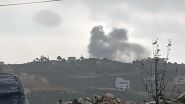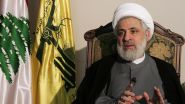
Lebanon is at a crossroads: disarm Hezbollah "as soon as possible," implement the ceasefire agreement with Israel, and carry out essential reforms, or face isolation.
This was made clear by Morgan Ortagus, the US Deputy Special Envoy for the Middle East, during an interview with LBCI on Sunday evening.
While expressing optimism about the new government, Ortagus emphasized the need for concrete actions to form a genuine partnership with the United States. She praised the inclusion of reformers in the government but stressed that measures must be taken to move forward.
Ortagus repeatedly raised the issue of disarming Hezbollah. She pointed out that this issue is not just about Hezbollah but all militias in Lebanon, including Palestinian factions supported by Iran. "We always bring up this issue with Lebanese officials and continue to pressure the government to fully implement the ceasefire with Israel," she said.
Though Ortagus expressed being "very encouraged" by the current government, she also conveyed some skepticism. Her central message was clear: "If you want a partnership with the US, you must meet certain criteria."
Lebanon now faces a crucial decision: "Disarm Hezbollah, implement the ceasefire, and end corruption. If these goals are achieved, we will be strong partners. But if there are delays, Lebanon should not expect cooperation from us," Ortagus warned.
She also highlighted the US support for the Lebanese Army over the years through training, funding, and equipment. "Now, under the leadership of President Joseph Aoun, the army is ready to exercise more authority. We will help it achieve its goals," she said.
Ortagus stressed that the sooner the Lebanese Army attains its goals, the sooner the Lebanese people will be liberated from foreign influence, terrorism, and fear.
When questioned about the possibility of normalization with Israel, Ortagus explained that this topic had not been discussed with Lebanese officials. "The US is focused on ensuring the implementation of the ceasefire, disarming Hezbollah, and supporting economic reforms in Lebanon," she noted. "We hope to eventually enter negotiations with Israel to resolve border disputes and other issues."
Ortagus also revealed that President Joseph Aoun did not reject, in her presence, the idea of establishing three diplomatic commissions to discuss with Israel the issue of Lebanese detainees, border demarcation, and the withdrawal of Israeli forces from southern Lebanon.
“Help Us to Help You”
Ortagus gave a sort of summary of her two-day series of intensive meetings with Lebanese officials, including President Joseph Aoun, Speaker Nabih Berri, and Prime minister Nawaf Salam. Among the topics discussed were Hezbollah’s weapons, the implementation of the ceasefire agreement with Israel, and the financial reforms Lebanon is expected to make.
She disclosed that she met with nine Lebanese ministers to discuss reforms, particularly those aimed at ending endemic corruption.
Unlike her first visit to Lebanon in February, Ortagus did not make any public statements after her meetings this time. During her earlier visit, she had openly shared details of her discussions with Lebanese officials.
According to political sources quoted by Houna Loubnan, Ortagus remained silent about the details of her conversations because “she was not convinced” by the Lebanese responses she heard.
When the officials presented the measures already taken and those being considered during their meetings with her, such as implementing the ceasefire and UN Security Council Resolution 1701, as well as financial reforms, Ortagus reportedly reminded them, “Many promises have been made in the past, but none have been fulfilled, which is unacceptable.” "We will judge based on results," she reportedly added.
The sources indicated that Ortagus’s message was firm, particularly when she linked Lebanon's reconstruction to the swift and definitive resolution of Hezbollah’s weapons issue. She repeated the remark made by French President Emmanuel Macron’s special envoy, Jean-Yves Le Drian, during his mission to Lebanon in June 2020: “Help us to help you.”



Comments